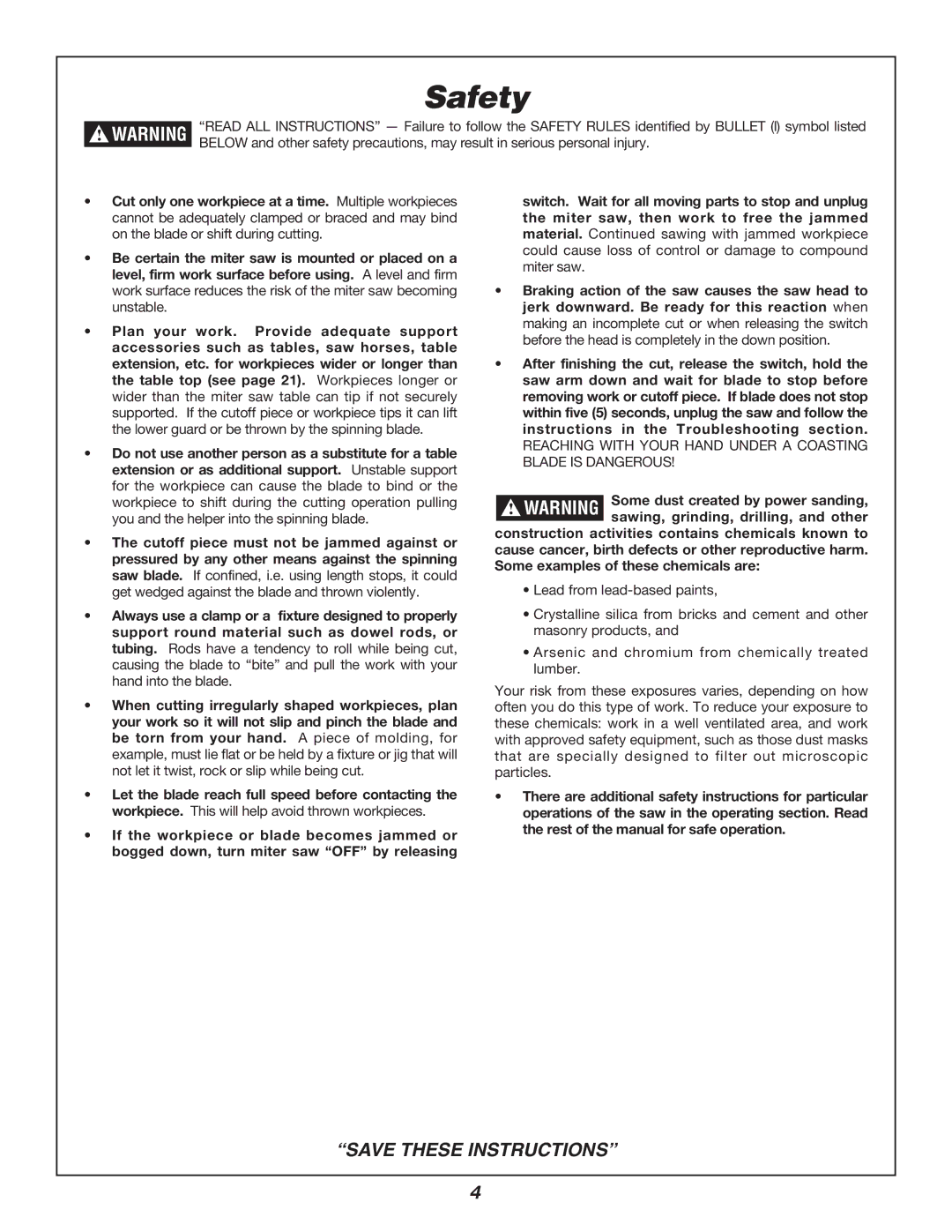
| Safety |
| “READ ALL INSTRUCTIONS” — Failure to follow the SAFETY RULES identified by BULLET (l) symbol listed |
! WARNING | |
| BELOW and other safety precautions, may result in serious personal injury. |
| |
|
|
•Cut only one workpiece at a time. Multiple workpieces cannot be adequately clamped or braced and may bind on the blade or shift during cutting.
•Be certain the miter saw is mounted or placed on a level, firm work surface before using. A level and firm work surface reduces the risk of the miter saw becoming unstable.
•Plan your work. Provide adequate support accessories such as tables, saw horses, table extension, etc. for workpieces wider or longer than the table top (see page 21). Workpieces longer or wider than the miter saw table can tip if not securely supported. If the cutoff piece or workpiece tips it can lift the lower guard or be thrown by the spinning blade.
•Do not use another person as a substitute for a table extension or as additional support. Unstable support for the workpiece can cause the blade to bind or the workpiece to shift during the cutting operation pulling you and the helper into the spinning blade.
•The cutoff piece must not be jammed against or pressured by any other means against the spinning saw blade. If confined, i.e. using length stops, it could get wedged against the blade and thrown violently.
•Always use a clamp or a fixture designed to properly support round material such as dowel rods, or tubing. Rods have a tendency to roll while being cut, causing the blade to “bite” and pull the work with your hand into the blade.
•When cutting irregularly shaped workpieces, plan your work so it will not slip and pinch the blade and be torn from your hand. A piece of molding, for example, must lie flat or be held by a fixture or jig that will not let it twist, rock or slip while being cut.
•Let the blade reach full speed before contacting the workpiece. This will help avoid thrown workpieces.
•If the workpiece or blade becomes jammed or bogged down, turn miter saw “OFF” by releasing
switch. Wait for all moving parts to stop and unplug the miter saw, then work to free the jammed material. Continued sawing with jammed workpiece could cause loss of control or damage to compound miter saw.
•Braking action of the saw causes the saw head to jerk downward. Be ready for this reaction when making an incomplete cut or when releasing the switch before the head is completely in the down position.
•After finishing the cut, release the switch, hold the saw arm down and wait for blade to stop before removing work or cutoff piece. If blade does not stop within five (5) seconds, unplug the saw and follow the instructions in the Troubleshooting section.
REACHING WITH YOUR HAND UNDER A COASTING BLADE IS DANGEROUS!
!WARNING Some dust created by power sanding, sawing, grinding, drilling, and other
construction activities contains chemicals known to cause cancer, birth defects or other reproductive harm. Some examples of these chemicals are:
•Lead from
•Crystalline silica from bricks and cement and other masonry products, and
•Arsenic and chromium from chemically treated lumber.
Your risk from these exposures varies, depending on how often you do this type of work. To reduce your exposure to these chemicals: work in a well ventilated area, and work with approved safety equipment, such as those dust masks that are specially designed to filter out microscopic particles.
•There are additional safety instructions for particular operations of the saw in the operating section. Read the rest of the manual for safe operation.
“SAVE THESE INSTRUCTIONS”
4
